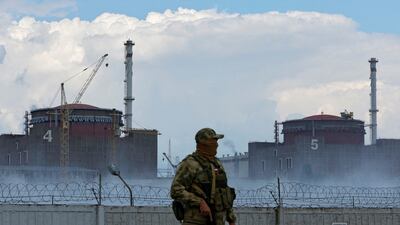UN nuclear inspectors were en route to Ukraine on Monday in a highly sensitive mission to prevent the conflict from causing a disaster at Europe's biggest atomic plant.
The long-awaited visit by the International Atomic Energy Agency comes after weeks of shelling near the Zaporizhzhia plant, occupied by Russian troops since the early stages of the war.
The fighting near Zaporizhzhia and its six reactors has raised fears of a catastrophe to match the 1986 Chernobyl disaster in what was then Soviet Ukraine.
Inspectors will assess the physical damage after shelling that Russia and Ukraine blame on each other, which led to the plant being partly disconnected from Ukraine's power grid.
They will check on the condition of staff, look at whether safety systems are functioning and perform "urgent safeguards activities," the UN agency said.
"The day has come," said IAEA chief Rafael Grossi, as he announced the support and assistance mission was on its way and would descend on Zaporizhzhia later this week.
"We must protect the safety and security of Ukraine and Europe's biggest nuclear plant," he said.
The visit was welcomed by the G7 countries, who said in a statement that it should go ahead "in a manner that respects full Ukrainian sovereignty over its territory".
Russia occupies the area around the nuclear plant but it is still operated by Ukrainian staff, who said there were serious risks to the site's operation.
Concerns have heightened as the front line of fighting shifted towards Ukraine's south. UN Secretary General Antonio Guterres warned that attacks on the plant would be "a suicidal thing".
The latest artillery fire was said to have damaged some of Zaporizhzhia's outbuildings, housing water treatment plants and equipment repair shops, about 100 metres from the nuclear reactors.
However, the IAEA offered some reassurance by saying there was no increase in radiation levels after the most recent shelling.
Ukraine says Russia is committing "nuclear blackmail" by attacking and occupying the site and has called for the UN to step in and demilitarise the area.
But Moscow rejected the idea of demilitarising the area and said it was Ukraine firing shells at its own nuclear plant.
Ukraine conflict - in pictures
The two sides also blamed each other for the long-running impasse over the IAEA's visit, which Mr Grossi said was needed to check out the contradictory claims.
Mr Grossi told the UN Security Council this month that inspectors would want to verify that nuclear material is being used only for peaceful purposes.
He earlier said that every principle of nuclear safety, including a secure power supply and the safety of staff, was being thrown out of the window at Zaporizhzhia.
Russia's manoeuvres at Zaporizhzhia were separately blamed for the collapse of UN-brokered talks on nuclear proliferation on Saturday.
No text was adopted because Russia objected to a passage raising concern about the radiological risk arising from its control of Zaporizhzhia.












